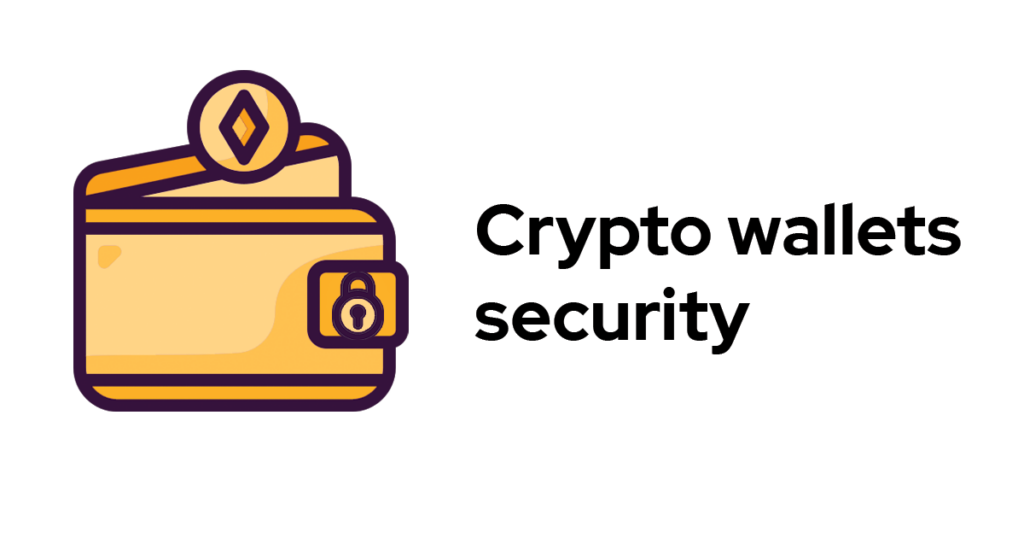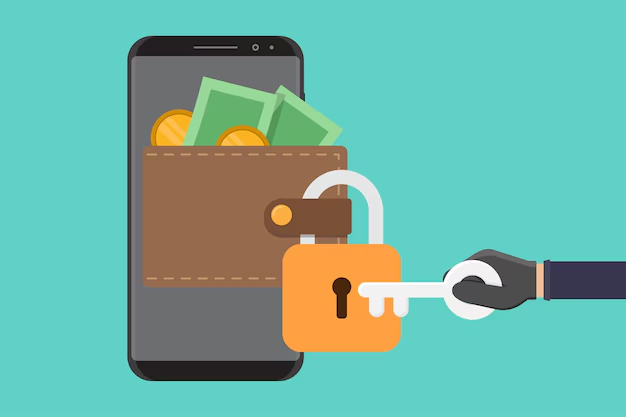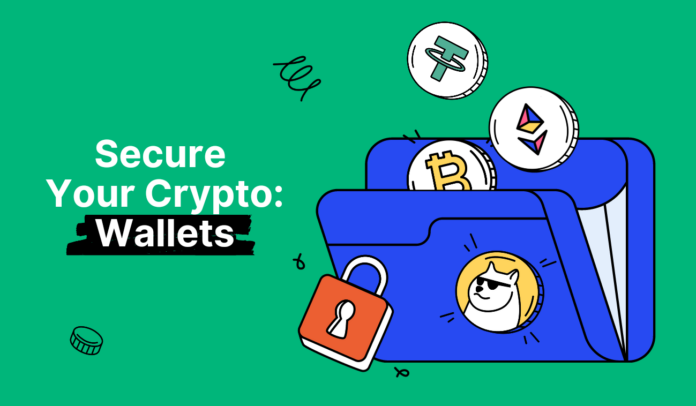Introduction to Wallet Security
In the world of cryptocurrency, securing your digital assets is paramount. Unlike traditional bank accounts, where the institution typically handles security, cryptocurrency users must take full responsibility for protecting their funds. Digital wallets are the cornerstone of this responsibility, as they store your private keys—essentially the keys to your crypto kingdom. Whether you’re an experienced trader or a beginner, understanding the importance of wallet security is essential for protecting your assets from theft, loss, and unauthorized access

1. What is a Cryptocurrency Wallet?
A cryptocurrency wallet is a digital tool that allows you to store, send, and receive cryptocurrencies. It functions similarly to a traditional bank account but without an intermediary. Wallets come in different forms, including software (hot) wallets and hardware (cold) wallets, each with varying levels of security.
2. Types of Cryptocurrency Wallets
Hot Wallets (Software Wallets)
Hot wallets are connected to the internet, making them convenient for frequent transactions but also more vulnerable to online threats. Examples include:
- Desktop Wallets: Installed on a personal computer, such as Electrum or Exodus.
- Mobile Wallets: Apps installed on smartphones, such as Trust Wallet or Coinbase Wallet.
- Web Wallets: Accessible through browsers, such as MetaMask or Blockchain Wallet.
Cold Wallets (Hardware Wallets)
Cold wallets are physical devices that store your private keys offline, providing a higher level of security. Because they are not connected to the internet, they are far less susceptible to hacking attempts. Examples include:
- Hardware Wallets: Devices like Ledger Nano S/X or Trezor, which securely store private keys offline.
- Paper Wallets: Physical documents containing private keys and public addresses, which must be kept safe from physical threats.

3. The Importance of Private Keys
Private keys are the most critical element of cryptocurrency security. A private key is a secret code that allows you to access and manage the funds in your wallet. If someone gains access to your private key, they essentially have control over your assets, and you may lose them forever.
How to Keep Private Keys Secure
- Never Share Your Private Key: Your private key should be kept entirely confidential. If someone else has it, they can access your wallet and withdraw your funds.
- Use Strong Passwords: Protect your wallet with a strong password to further secure your private keys.
- Use Multi-Signature (Multi-Sig) Wallets: Multi-sig wallets require more than one private key to approve a transaction, offering an extra layer of security.
4. Best Practices for Wallet Security
1. Backup Your Wallet
Always back up your wallet in multiple secure locations, such as an encrypted USB drive or a paper backup, to ensure that you don’t lose access to your funds in case your device is lost, stolen, or damaged. Most wallets will provide you with a recovery phrase (usually 12-24 words) to recover your private keys if you lose access to your wallet.
- Store Backups Safely: Store backups in secure, offline locations. Do not leave them in a place that could be easily accessed by others, such as on your computer or online storage.
2. Enable Two-Factor Authentication (2FA)
For added security, always enable two-factor authentication (2FA) on your wallet if it supports it. This additional step requires you to enter a code sent to your phone or generated by an app like Google Authenticator or Authy, making it much harder for hackers to gain access to your wallet.
3. Use Strong, Unique Passwords
Make sure that your wallet’s password is long, complex, and unique. A good password should contain a mix of upper and lowercase letters, numbers, and special characters. Avoid using easily guessable information like your name, birthdate, or common words.
- Password Manager: Consider using a password manager to securely store and manage your wallet passwords, especially if you have multiple wallets.
4. Keep Your Wallet Software Up-to-Date
Regularly update your wallet software to ensure that you have the latest security features and patches. Developers often release updates to fix vulnerabilities and improve the security of their wallets.
5. Avoid Phishing Attacks
Phishing is one of the most common ways hackers gain access to wallets. Always double-check the website URL before entering your wallet credentials. Be cautious of unsolicited emails or messages asking for your private information. If you receive a message or email that seems suspicious, do not click any links or download attachments.
- Verify Sources: Only use official websites and links from trusted sources to access your wallet or exchange accounts.
6. Use Cold Storage for Large Amounts of Cryptocurrency
If you hold a large amount of cryptocurrency, it’s recommended to use cold storage solutions like hardware wallets to keep your funds safe from online threats. Hardware wallets store your private keys offline, making it much harder for hackers to access them.
- Offline Storage: For an extra layer of security, consider storing your hardware wallet in a safe or lockbox.
5. Common Wallet Security Risks
1. Malware and Viruses
Malware can infect your computer or smartphone and steal your private keys or wallet passwords. Always use antivirus software to protect your devices and avoid downloading software from untrustworthy sources.
2. Social Engineering
Hackers can trick you into revealing your private keys or login information through phone calls, emails, or fake websites. Always be cautious when sharing personal information and verify the legitimacy of any request.
3. Loss of Backup or Recovery Phrase
If you lose access to your backup or recovery phrase, you may lose access to your cryptocurrency wallet forever. It’s essential to store your backup in a secure, offline location and ensure it is not easily lost or damaged.
4. Exchange Wallets
While exchanges provide convenience for trading, they are also susceptible to hacks. It’s generally not advisable to store large amounts of cryptocurrency on exchanges for an extended period. If you must use an exchange wallet, enable additional security measures such as 2FA.
6. Recovering from a Security Breach
If you believe your wallet has been compromised or your private key has been stolen, act quickly to mitigate the damage:
- Move Your Funds: If possible, transfer your funds to a new, secure wallet as soon as you realize your wallet has been compromised.
- Contact Support: Reach out to the wallet provider or exchange for support if you suspect any fraudulent activity.
- Report the Incident: In case of a major breach, report it to relevant authorities and your crypto community for awareness.
7. Conclusion: Stay Vigilant and Secure Your Assets
Wallet security is a crucial aspect of cryptocurrency ownership, and it requires continuous vigilance. By understanding the different types of wallets, implementing best practices for securing your private keys, and being aware of potential risks, you can protect your digital assets from loss or theft. Cryptocurrency security is an ongoing effort, so always stay informed and adopt new strategies as the security landscape evolves.


